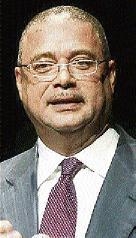Barbados enters recession
Published: Friday | July 31, 2009

Prime Minister of Barbados David Thompson.
The governor of the Barbados Central Bank says the Caribbean island's economy is in recession.
But Prime Minister David Thompson said his country would not follow Jamaica's lead and seek help from the International Monetary Fund. (IMF).
Bank governor Marion Williams said Tuesday the economy has contracted by 3.0 per cent through the first two quarters of the year amid the global economic slowdown.
But the central bank chief also said at a news conference that the economy was not in crisis because the country has sufficient foreign reserves - unlike the early 1990s when Barbados endured a deep recession.
Barbados is one of the most prosperous countries in the Western Hemisphere. Its economy is based on tourism, offshore banking and financial services.
"Barbados still has an investment grade rating so we can still go to the capital markets, and currently we are in the process of securing a loan from the Trinidad market, so that we are not in the exact position like Jamaica," said Thompson Wednesday.
"I think that Jamaica is going through that wrenching scenario of having to face the idea of re-opening old wounds."
He insisted that his government, which was elected just over a year ago, had no intention of re-opening the wounds of the 1990s when the island was forced into an austere structural adjustment programme with the IMF.
Thompson, who was finance minister at the time, said his immediate job as prime minister was to ensure that Barbados does "not have to walk that road" again.
"I am acutely aware of what we went through in 1991, and I praise the perseverance and the ability of Barbadians essentially to stand up and defend what they thought was important to them."
The Barbados government will still be drawing down on funds from the IMF.
"St Vincent and the Grenadines is drawing down as well as countries like Barbados on their reserves within the IMF," he said.
"In terms of Barbados, I believe the estimate is about BDS$80 million (US$40 million) and it would assist in our external position, but that is not an IMF programme, it is what we are entitled to."
Several Caribbean countries including St Lucia, Dominica and St Kitts and Nevis have so far this year accessed IMF funds under the rapid-access component of the Exogenous Shocks Facility (ESF).
Wire reports




















